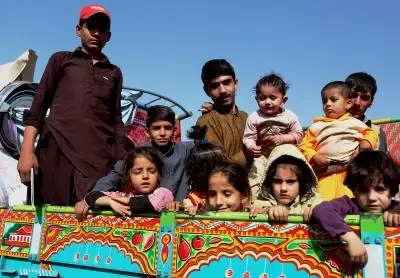Is Pakistan Intensifying Crackdown on Afghan Refugees Amid Rising Tensions with Kabul?

Synopsis
Key Takeaways
- Over 666,000 Afghan refugees have been deported from Pakistan in 2023.
- Pakistan's government cites security concerns linked to the Tehrik-e-Taliban Pakistan.
- Many deported individuals have lived in Pakistan for over 40 years.
- The situation remains tense following a ceasefire on October 19.
- There are fears of a looming humanitarian crisis in the region.
New Delhi, Oct 26 (NationPress) Pakistan's stance towards the 2.8 million Afghan refugees who have resided within its borders for decades has turned increasingly hostile. Islamabad has initiated a comprehensive campaign of deportations under the guise of fighting terrorism.
As reported by France 24, over 666,000 Afghan refugees have already been expelled since the start of this year. This initiative has drawn significant criticism from humanitarian organizations and has exacerbated the already tense relations between Pakistan and Afghanistan.
The Pakistani government claims that the Tehrik-e-Taliban Pakistan (TTP), also known as the Pakistani Taliban, has established safe havens across the border in Afghanistan. From there, militants allegedly orchestrate and execute attacks on Pakistani security forces.
This year has seen an unprecedented rise in such attacks, which has prompted Islamabad to implement severe actions to, as officials assert, “regain control” over border areas.
As tensions escalate amid a flurry of attacks and increasing violence along the Durand Line, violent confrontations have occurred, which were temporarily halted after both sides reached a ceasefire agreement on October 19. The situation remains tense and precarious.
Entire neighborhoods populated by Afghans in Pakistani cities have been dismantled, refugee camps have been shut down, and new systems have been established — particularly in Punjab — to enable citizens to report the presence of “illegal immigrants”, according to France 24.
Initially, Islamabad’s deportation initiative focused on undocumented migrants and those who arrived recently. However, since September 1, even Afghans registered with the UNHCR have faced expulsion.
Many of these families have lived in Pakistan for over 40 years, contributing to local economies and communities.
For countless Afghan refugees, the government's ultimatum presents a daunting choice: stay hidden to evade detention and deportation or return to a Taliban-controlled Afghanistan — a nation where women and girls are denied education, civil rights are restricted, and the economy is in disarray.
As this campaign persists, observers caution that Pakistan’s actions could precipitate a humanitarian crisis throughout the region.
What started as a security measure has now morphed into mass displacement, compelling generations of Afghans to once again forsake the only home they have known for decades.









